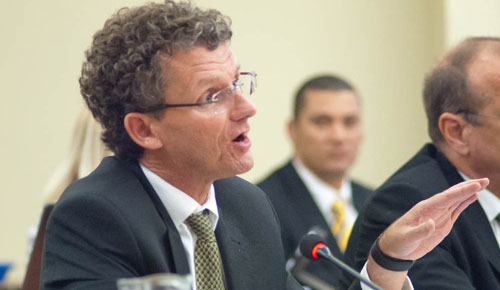
In a new submission to the Competition Tribunal at hearings into alleged anticompetitive behaviour by Telkom, the Competition Commission has recommended to the tribunal that it impose a fine of nearly R1,2bn against the company.
This is less than the maximum R3,5bn fine analysts said it could have asked the tribunal to impose, but Telkom legal counsel on Wednesday argued that the proposed penalty was still “jaw-droppingly inappropriate”. The tribunal hearings wrapped up on Wednesday.
If it’s found guilty by the tribunal, Telkom wants a fine of only R20,5m imposed on it, which equates to less than 2% of the penalty the commission wants.
The case dates back more than eight years and relates to complaints brought to the commission by Telkom rivals, which accused the company of a range of market abuses in the early part of last decade.
Speaking for Telkom at the hearings on Wednesday, Adv Willem van der Linde said that by the commission’s own admission it had not wanted a “swingeing” punishment. But that this was exactly what its proposed R1,2bn fine amounted to.
In its submission, the commission has argued that Telkom should be fined for the full five years that the alleged abuses took place. “The conduct impacted directly on the market for [leased-line] Diginet services and indirectly on the [virtual private network, or VPN] and Internet access markets,” it said. “Therefore, the penalty should be based on the combination of the revenues earned by Telkom.”
Furthermore, the commission wants a factor of 10% applied to the affected turnover. “Applying these principles, a penalty of R1 168 549 735 is appropriate,” it said.
It added that Telkom’s prior arguments that imposing a large fine on the company would be “catastrophic” for the company and “irretrievably jeopardise its viability” were “over-exaggerated”. It said that in cases where a substantial penalty was imposed, this could be paid off over time. The commission also said the recent decline in net profit at Telkom — which the company has used to try to convince the tribunal not to impose a large fine — was mainly the result of investment in cellular operator 8ta and not problems in its main business.
Telkom argued the commission’s figure was arrived at in error by looking at the company’s turnover from Diginet lines, Internet access and VPN services. Diginet revenues should not be factored into the calculation at all, it argued.

Senior counsel Alfred Cockrell, speaking for Telkom, said the penalty should be calculated using Telkom’s “affected” turnover only, rather than total revenue. He said the aim of the tribunal was to mete out “appropriate” penalties and that the calculations suggested by the commission would result in punishment that was not appropriate or proportionate.
Furthermore, he said the commission was calling for the fine on the basis that the alleged infringements took place over five years. Rather than using the turnover figures for each year, it had opted to take the figure for the year ended 31 March 2004 — which he said was the highest amount — and multiplied that by five.
“This approach is neither mandated by the law nor does it have any regard to the constitutional principle of proportionality,” Cockrell argued.
“It gives rise to a penalty which is excessive in the extreme and not justified by any norm of reasonableness,” he says. “Should such a penalty be imposed on Telkom, it may well lead to its financial demise. This will have a catastrophic impact on the SA economy as a whole.”
Telkom said that although it believes revenue arising from Diginet lines should be wholly excluded from the calculation, if the tribunal felt otherwise, the only appropriate portion of Diginet revenue that should be considered was that which came from VPN services to value-added network services (Vans) providers to connect these companies to network points of presence.
Cockrell also argued that if Telkom was found guilty of the excessive pricing complaint, rather than the additional complaint of withholding essential services, this amounted to “a margin squeeze or price discrimination”, neither of which qualified for a fine “in the case of a first time offender”.
Speaking again to the issue of “proportionality”, Cockrell said an administrative penalty was not intended to be punitive but that the commission was “seeking a fine that is nakedly punitive” and that in doing so it created “a rod to its own back” because such a penalty would be “blatantly swingeing”, something the commission had said it opposed.
Telkom also argued that the proposed penalty was excessive against previous fines imposed by the tribunal. The commission’s proposed fine was “hopelessly out of kilter” with what the tribunal had imposed in the past, Cockrell said.
Telkom said the tribunal was not obliged to impose a penalty at all but that if it felt a penalty was fitting “it should be nominal or symbolic”.
The tribunal said Telkom had only supplied information about what shouldn’t be considered and asked the company to supply what it deemed an appropriate figure. In reply, it said an appropriate figure, if it was deemed to have engaged in excessive pricing, was 5% of the figure of R410m, which is the sum of VPN and Internet access revenues for 2004. That amounted to R20,5m.
It said that should it be found to have restricted access to essential services, the penalty should be a third of the fine for excessive pricing, or roughly R6,8m.
It’s not known when the tribunal will decide on the matter. — Craig Wilson, TechCentral
- Subscribe to our free daily newsletter
- Follow us on Twitter or on Google+ or on Facebook
- Visit our sister website, SportsCentral (still in beta)




